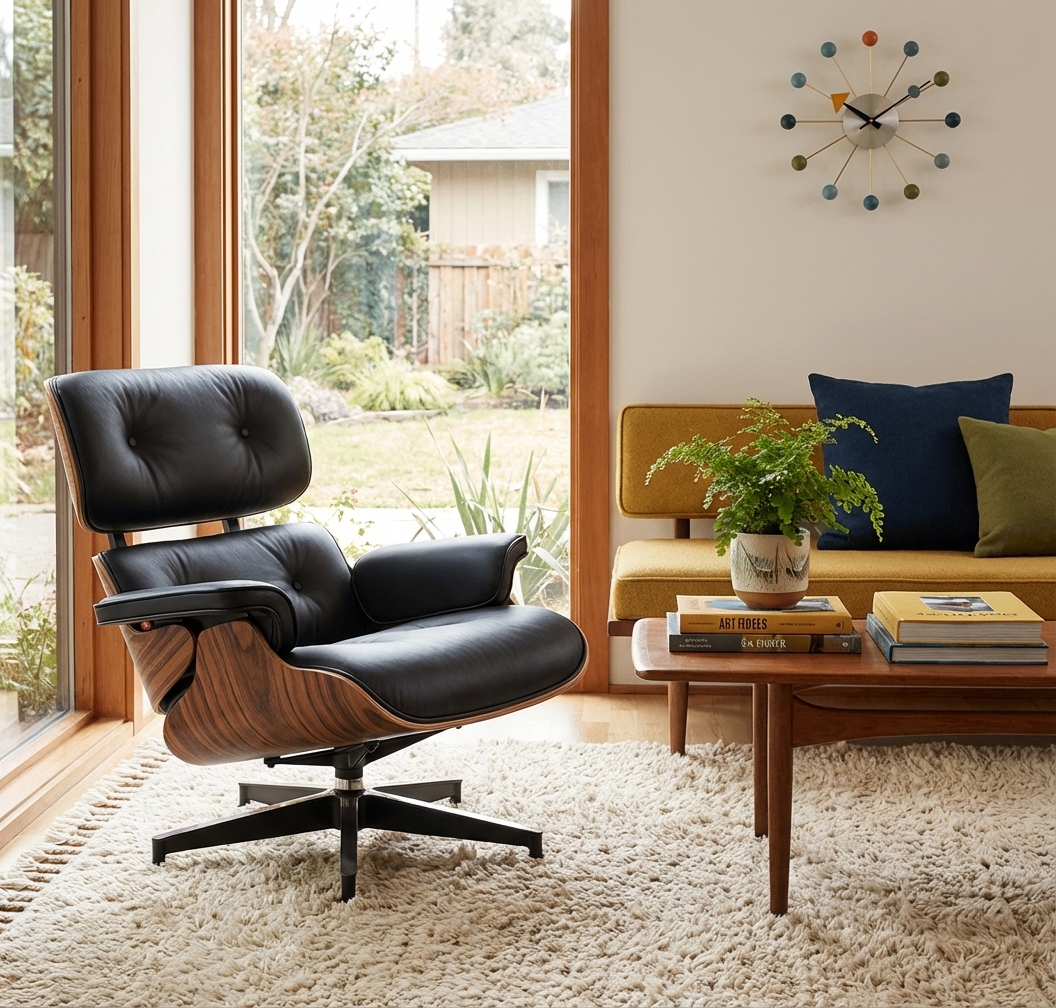George Nelson: The Mind Behind Mid-Century Modern Classics

Few names are as deeply connected to mid-century modern design as George Nelson. As an architect, designer, and visionary thinker, Nelson played a central role in defining the look and feel of the mid-20th century. His influence stretches from iconic furniture pieces to the broader philosophy of design as a response to human need.
In this article, we take a closer look at George Nelson and his role in shaping one of the most enduring design movements. From the famous Coconut Chair to the instantly recognisable Bubble Lamps, Nelson's legacy lives on in stylish interiors across the UK and around the world.
Who Was George Nelson?
Born in 1908 in Hartford, Connecticut, George Nelson studied architecture at Yale University before becoming one of the key figures in 20th-century design. Though trained as an architect, he quickly transitioned into industrial design, journalism, and creative direction.
Career Highlights:
- Director of Design at Herman Miller from 1945 to 1972
- Collaborated with designers like Charles and Ray Eames, Isamu Noguchi, and Alexander Girard
- Authored influential essays on design and modern living
- Founded his own design studio, George Nelson Associates, responsible for many of his most famous works
Nelson was not just a designer but a design thinker. He believed that good design should be both beautiful and functional — a principle still relevant today.
Iconic Designs by George Nelson
1. The Coconut Chair (1955)
One of Nelson's most recognisable pieces, the Coconut Chair was designed to be inviting, open, and playful. Its wide, curved seat resembles a sliced coconut and provides unexpected comfort.
Perfect for: Lounge areas, reading corners, or modern office lobbies
2. The Marshmallow Sofa (1956)
Playful and bold, the Marshmallow Sofa broke with traditional design rules. It featured colourful, circular cushions attached to a metal frame — a piece that still feels avant-garde today.
Ideal in: Statement-making living rooms or eclectic commercial spaces
3. The Ball Clock and Sunburst Clock (1949–1950s)
Part of a series of wall clocks designed by Nelson and his studio, these clocks added flair and personality to everyday interiors. The Sunburst Clock, in particular, became a symbol of postwar optimism.
Seen in: Mid-century inspired kitchens, lounges, and office spaces
4. The Platform Bench (1946)
Simple yet elegant, the Platform Bench blends utility with visual appeal. Made from slatted wood, it serves as a bench, low table, or display surface.
Popular in: Hallways, bedrooms, or minimalist living rooms
5. The Bubble Lamp Series (1952)
Using innovative materials and manufacturing techniques, Nelson created a series of lamps covered in a translucent polymer that diffuses light softly and evenly. These designs remain popular lighting options today.
Best suited to: Dining rooms, offices, or Scandi-modern interiors
George Nelson’s Influence on Modern Interiors
Nelson’s designs helped shape what we now recognise as mid-century modern — clean lines, organic shapes, innovative materials, and a focus on livable design.

Key values he championed:
- Functionality first: Objects should be designed to solve real-life problems
- Simplicity and clarity: Form follows purpose
- Joy in design: Playfulness and humour were essential in making spaces human
- Design for everyone: Good design should be accessible and democratic
These principles continue to guide interior designers, furniture makers, and architects today.
George Nelson’s Impact in the UK
While Nelson was American, his influence crossed the Atlantic. In the UK, his work has become increasingly popular among homeowners, architects, and interior stylists who appreciate his ability to blend form and function.
Why Nelson matters to UK design lovers:
- Fits well in smaller UK homes due to compact, space-efficient designs
- Works with a variety of aesthetics, from Scandi to industrial
- Adds character without overpowering a room
- Highly compatible with other mid-century pieces from European designers like Arne Jacobsen and Alvar Aalto
How to Style George Nelson Pieces in Your Home
Combine with Other Mid-Century Classics
Pair a Nelson Bubble Lamp with an Eames Lounge Chair or a Saarinen Tulip Table for a cohesive mid-century look.
Use as Statement Pieces
Let a Marshmallow Sofa or Coconut Chair take centre stage in a minimalist space.
Mix with Contemporary Decor
Nelson’s designs are clean and timeless, making them easy to pair with modern sofas, neutral palettes, or even industrial finishes.
Keep It Functional
Use a Platform Bench at the end of the bed or in an entryway. Use his clocks to add character to an otherwise minimalist wall.
Where to Find George Nelson-Inspired Furniture in the UK
FAQs
Are George Nelson pieces still made today?
Yes. Many of his designs are still produced under license by Herman Miller and Modernica, among others.
Can I find authentic George Nelson pieces in the UK?
Yes, through select retailers and vintage markets. You can also find high-quality replicas online if you prefer affordability.
What makes his designs so timeless?
Nelson’s work focuses on simple forms, human-centred functionality, and materials that age gracefully — all factors that contribute to long-lasting appeal.
Are Nelson’s designs suitable for small UK homes?
Absolutely. Many of his pieces are compact and versatile, ideal for urban flats or rooms with limited space.
How can I spot a quality replica?
Look for